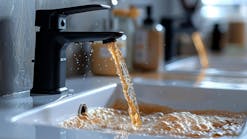About the author:
Jake Cobb can be reached through Ben Frech, public relations & regional public policy manager for the National Ground Water Association. Frech can be reached at [email protected].
Compiled by Cristina Tuser
undefined
WQP Associate Editor Cristina Tuser spoke to Jake Cobb, a recipient of The Groundwater Foundation and Franklin Electric’s 2020 Len Assante Scholarship, which is awarded to individuals who are pursuing educational opportunities to advance careers in the groundwater industry. Cobb and the other recipients are enrolled in a program offering instruction in water well systems and/or water well drilling, construction and service.
Cristina Tuser: How did you find out about this program?
Jake Cobb: We originally found out about the well construction program at Southwest [Mississippi Community College in Summit Country, Mississippi] online. We made a few phone calls to the instructor, Clinton Dunn, and he asked us to come down to Summit, Missouri, so he could show us around the campus and answer any questions we had about the program.
I went down with two of my sons. Our goal was to go into the water well drilling business together. When we finished talking with Dunn, the only question that we still had was which one of the three of us would enroll in the program. It turned out to be me.
Tuser: Give a brief summary of your background and skills.
Cobb: I have a background in construction. At the time, I was working with one of my sons clearing land, building house pads and installing septic tanks and treatment plants.
Tuser: What is an area or skill you felt you wanted to work on in this program?
Cobb: The program teaches about all types and aspects of drilling, oil field, cathodic protection, geotechnical, etc. But my main interest was residential water wells. We drill with a Portadrill kelly rig at the school. All the residential water wells in our area are mud rotary.
Tuser: What has been your favorite experience or part of the program so far?
Cobb: Making new friends with students, faculty and staff. Southwest is a great place to go to school.
Tuser: Is there an aspect of it that surprised or challenged you?
Cobb: A surprise was when Dunn said Franklin Electric was giving five $1,000 scholarships to sophomores this year, and I got one of them. Thank you, Franklin [Electric].
One of the biggest challenges was probably drilling and hitting a certain type of gravel that causes the fluid in your borehole to disappear so fast that if you did not know better, you would think your mud pump suddenly started sucking fluid out of the hole rather than pumping it in. Then you have to stop the loss, get circulation back and keep on drilling.
Tuser: How do you anticipate this opportunity will shape your career?
Cobb: Going through the program has been a great benefit to me. Not only do you learn how to overcome a problem while you are drilling, but you learn there may be three or four different ways to solve that problem and why each one of them works. Then you can decide which one will work best in the situation you are in. Ultimately, you not only make a well, but you make the best well that you can make at that particular location.
Tuser: How have your skills improved from day one to now?
Cobb: I am definitely a safer driller. Every Monday morning we had a class on safety. It was “drilled” into us to always wear your PPE, keep a clean and safe working environment and most of all “look up and live.” Do not raise the mast up into power lines. The biggest improvement is probably in problem-solving skills. The instructor would often say, ”People are not looking for operators, they are looking for drillers. And drillers have to be problem solvers.” Learning how to tell what is going on at the bottom of the hole by the sound the rig is making, and what is probably wrong with a customer’s pump, drop pipe, or pressure tank, just by talking to them, were just a few of the things I learned that definitely helped me to be a better driller.
*Responses have been edited for clarity and length.



